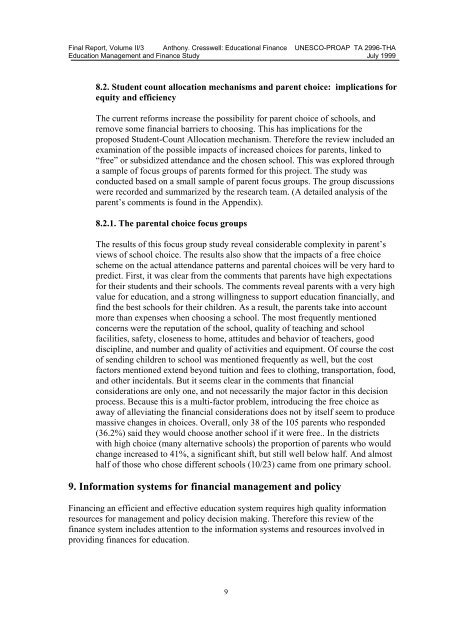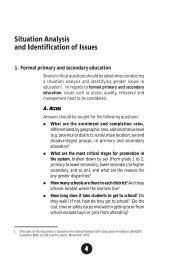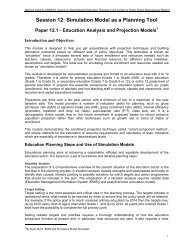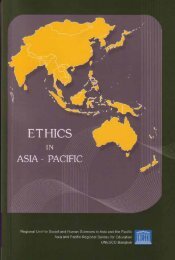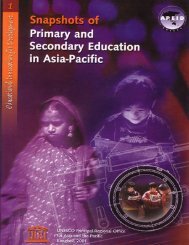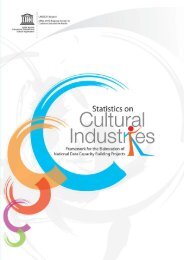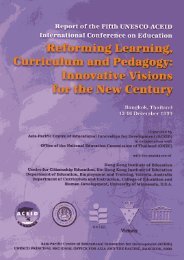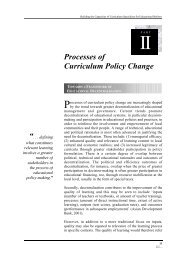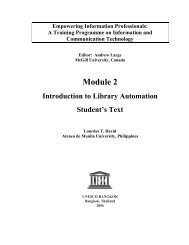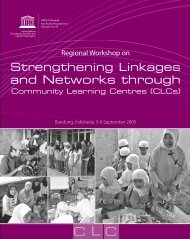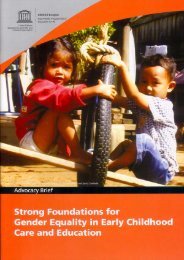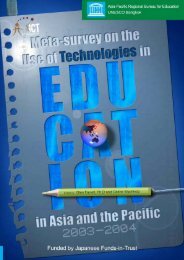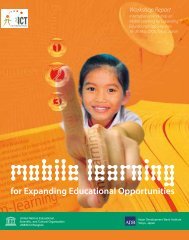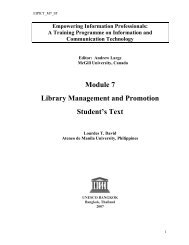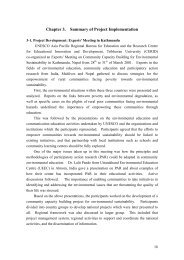Educational Finance in Thailand - UNESCO Bangkok
Educational Finance in Thailand - UNESCO Bangkok
Educational Finance in Thailand - UNESCO Bangkok
You also want an ePaper? Increase the reach of your titles
YUMPU automatically turns print PDFs into web optimized ePapers that Google loves.
F<strong>in</strong>al Report, Volume II/3 Anthony. Cresswell: <strong>Educational</strong> <strong>F<strong>in</strong>ance</strong> <strong>UNESCO</strong>-PROAP TA 2996-THA<br />
Education Management and <strong>F<strong>in</strong>ance</strong> Study July 1999<br />
8.2. Student count allocation mechanisms and parent choice: implications for<br />
equity and efficiency<br />
The current reforms <strong>in</strong>crease the possibility for parent choice of schools, and<br />
remove some f<strong>in</strong>ancial barriers to choos<strong>in</strong>g. This has implications for the<br />
proposed Student-Count Allocation mechanism. Therefore the review <strong>in</strong>cluded an<br />
exam<strong>in</strong>ation of the possible impacts of <strong>in</strong>creased choices for parents, l<strong>in</strong>ked to<br />
“free” or subsidized attendance and the chosen school. This was explored through<br />
a sample of focus groups of parents formed for this project. The study was<br />
conducted based on a small sample of parent focus groups. The group discussions<br />
were recorded and summarized by the research team. (A detailed analysis of the<br />
parent’s comments is found <strong>in</strong> the Appendix).<br />
8.2.1. The parental choice focus groups<br />
The results of this focus group study reveal considerable complexity <strong>in</strong> parent’s<br />
views of school choice. The results also show that the impacts of a free choice<br />
scheme on the actual attendance patterns and parental choices will be very hard to<br />
predict. First, it was clear from the comments that parents have high expectations<br />
for their students and their schools. The comments reveal parents with a very high<br />
value for education, and a strong will<strong>in</strong>gness to support education f<strong>in</strong>ancially, and<br />
f<strong>in</strong>d the best schools for their children. As a result, the parents take <strong>in</strong>to account<br />
more than expenses when choos<strong>in</strong>g a school. The most frequently mentioned<br />
concerns were the reputation of the school, quality of teach<strong>in</strong>g and school<br />
facilities, safety, closeness to home, attitudes and behavior of teachers, good<br />
discipl<strong>in</strong>e, and number and quality of activities and equipment. Of course the cost<br />
of send<strong>in</strong>g children to school was mentioned frequently as well, but the cost<br />
factors mentioned extend beyond tuition and fees to cloth<strong>in</strong>g, transportation, food,<br />
and other <strong>in</strong>cidentals. But it seems clear <strong>in</strong> the comments that f<strong>in</strong>ancial<br />
considerations are only one, and not necessarily the major factor <strong>in</strong> this decision<br />
process. Because this is a multi-factor problem, <strong>in</strong>troduc<strong>in</strong>g the free choice as<br />
away of alleviat<strong>in</strong>g the f<strong>in</strong>ancial considerations does not by itself seem to produce<br />
massive changes <strong>in</strong> choices. Overall, only 38 of the 105 parents who responded<br />
(36.2%) said they would choose another school if it were free.. In the districts<br />
with high choice (many alternative schools) the proportion of parents who would<br />
change <strong>in</strong>creased to 41%, a significant shift, but still well below half. And almost<br />
half of those who chose different schools (10/23) came from one primary school.<br />
9. Information systems for f<strong>in</strong>ancial management and policy<br />
F<strong>in</strong>anc<strong>in</strong>g an efficient and effective education system requires high quality <strong>in</strong>formation<br />
resources for management and policy decision mak<strong>in</strong>g. Therefore this review of the<br />
f<strong>in</strong>ance system <strong>in</strong>cludes attention to the <strong>in</strong>formation systems and resources <strong>in</strong>volved <strong>in</strong><br />
provid<strong>in</strong>g f<strong>in</strong>ances for education.<br />
9


